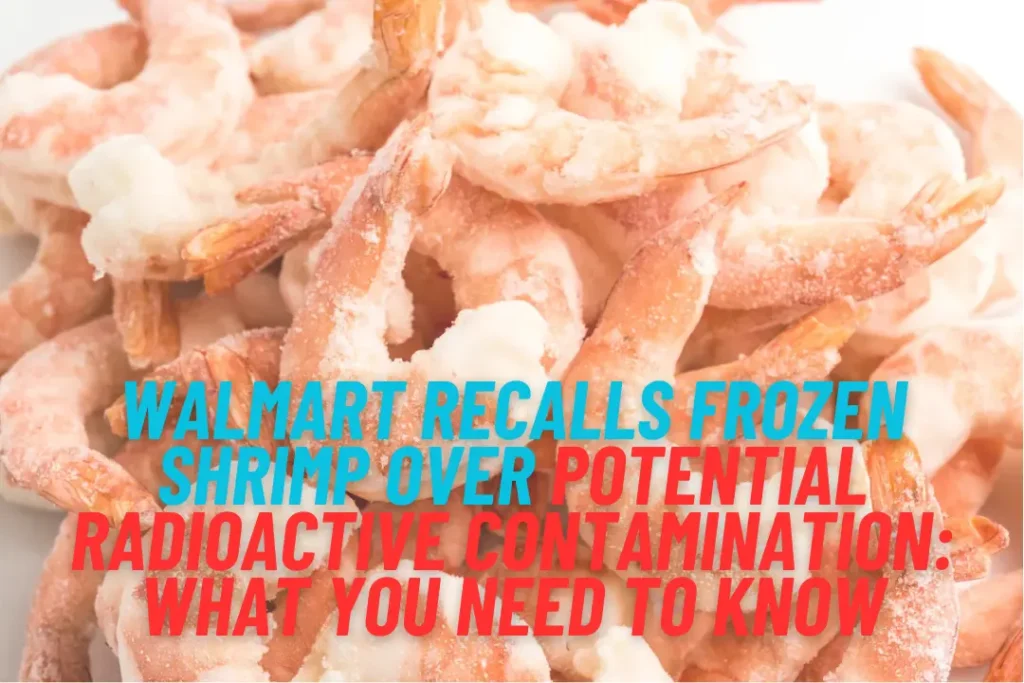Walmart Recalls Frozen Shrimp Over Potential Radioactive Contamination: What You Need to Know

In an unsettling development for seafood consumers across the U.S., Walmart has announced a recall of Great Value brand frozen raw shrimp after tests revealed potential contamination with Caesium-137, a radioactive isotope. Although the detected levels were well below the FDA’s threshold of concern, the move underscores the importance of food safety vigilance and raises fresh questions about global supply chain integrity.
The Background of the Recall
On August 18, 2025, the FDA confirmed that random import inspections flagged shipments of shrimp contaminated with Caesium-137. The shrimp in question came from PT. Bahari Makmur Sejati (BMS Foods), a major seafood supplier based in Indonesia.
While most contaminated shipments were stopped before reaching U.S. consumers, testing revealed that a limited batch of frozen shrimp had made its way onto Walmart shelves in 13 states, prompting the retailer to issue a recall.
Key Details Consumers Should Know
- Product involved: Great Value brand raw frozen shrimp (White Vannamei), 2-pound bags
- Supplier: BMS Foods, Indonesia
- Lot Codes: 8005540-1, 8005538-1, 8005539-1
- Best By Date: March 15, 2027
- States impacted: Florida, Texas, Ohio, Pennsylvania, North Carolina, South Carolina, Virginia, Georgia, New York, Maryland, Alabama, Louisiana, and Michigan
- Reported illnesses: None so far
Customers who purchased this product are advised to check the packaging immediately and dispose of any matching lot codes. Walmart has already removed the affected products from its stores.
What is Caesium-137?
Caesium-137 is a radioactive isotope created as a byproduct of nuclear fission—the same process used in nuclear reactors and during nuclear weapons testing.
Why it matters:
- Caesium-137 emits beta and gamma radiation, which can damage human DNA over prolonged exposure.
- The FDA’s safety threshold is 1,200 becquerels per kilogram (Bq/kg), while the contaminated shrimp contained about 68 Bq/kg.
- Though not an immediate health hazard, the FDA considers any detectable level in the food supply a serious concern, warranting removal.
How the Contamination Was Found
The shrimp recall followed a routine customs inspection at multiple U.S. ports, where Caesium-137 was detected in imported seafood containers.
- Customs notified the FDA.
- Additional testing confirmed traces of radioactive material in specific Walmart-bound shipments.
- Although the levels were low and not considered harmful short term, the FDA and Walmart acted under the “precautionary principle.”
The supplier, BMS Foods, is now under import alert—meaning its shipments cannot enter the U.S. until corrective measures are verified.
Broader Implications for Food Safety
This recall highlights growing concerns over seafood imports:
- The U.S. imports over 80% of its seafood, often from regions with less stringent safety controls.
- Contaminants—whether microbial (Listeria, Salmonella), chemical (antibiotics, pesticides), or radioactive—pose ongoing risks.
- Consumers are reminded to buy seafood from trusted retailers and check FDA recall alerts regularly.
What Consumers Should Do Now
If you bought Great Value shrimp recently:
Check your freezer – Look for the lot numbers and best-by dates listed.
Dispose safely – Do not consume shrimp from the recalled batch.
Do not return to stores – For radioactive recalls, disposal is safer than returns.
Monitor updates – Stay informed via the FDA recall page or Walmart customer service.
Contact Walmart – Customers may call Walmart’s helpline for questions on refunds.
Frequently Asked Questions (FAQs)
1. Is it dangerous if I have already eaten the recalled shrimp?
No illnesses have been reported. The level of Caesium-137 found was far below the FDA’s danger threshold. However, if you experience unusual health symptoms, consult a physician.
2. What exactly is Caesium-137, and how harmful is it?
Caesium-137 is a radioactive isotope used in industrial and medical applications. At high levels, it can cause radiation poisoning and increase cancer risk. The levels detected in the shrimp were low but still unacceptable for food consumption.
3. How do I know if my shrimp is part of the recall?
Check the brand (Great Value), lot codes (8005540-1, 8005538-1, 8005539-1), and best by date (03/15/2027) on the packaging. If it matches, discard immediately.
4. Can cooking or boiling the shrimp remove the contamination?
No. Radioactive contamination cannot be “cooked out.” Heat may kill bacteria, but it does not neutralise Caesium-137.
5. Which states were affected by the recall?
The recalled shrimp was distributed in at least 13 U.S. states, including Florida, Texas, Ohio, Pennsylvania, New York, and others.
6. Will Walmart issue refunds?
Yes. Customers who purchased the recalled shrimp may contact Walmart customer service for assistance. In many cases, proof of purchase is not required for safety recalls.
7. How often do food recalls for radioactivity happen?
Extremely rarely. Most recalls involve bacteria (like Listeria or Salmonella) or allergens. This is one of the first high-profile seafood recalls for radiation in recent U.S. history.
8. Should I avoid eating shrimp altogether?
No. The recall applies only to specific lots of Great Value frozen shrimp. Shrimp from other suppliers and brands remains safe. However, this event is a reminder to buy from reliable retailers and stay informed on recalls.
9. What steps is Walmart taking?
Walmart has:
- Removed affected products from all stores.
- Instructed customers to dispose of recalled shrimp.
- Coordinated with the FDA to trace contamination back to the supplier.
10. What happens to the supplier?
BMS Foods of Indonesia is now under an FDA import alert. They must provide evidence of corrective safety measures before their shrimp can re-enter the U.S. market.
Final Takeaway
The Walmart shrimp recall over potential radioactive contamination may sound alarming—but consumers should know that detected levels were low and no illnesses have been reported. The recall was issued out of an abundance of caution, reflecting both Walmart’s and the FDA’s commitment to food safety.
For shoppers, the best course of action is simple: check your freezer, discard affected shrimp, and stay updated on recall alerts.
This case also underscores a larger truth: in a world where seafood travels thousands of miles before reaching American dinner tables, vigilance in supply chain safety is more important than ever.



